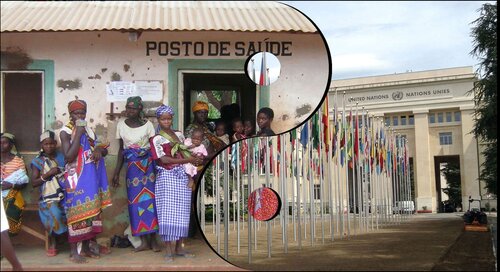On this World Health Day, we call for urgent action to realise...
8 November 2017
UHC2030 welcomes civil society organization Medicus Mundi International – Network Health for all (MMI) as a partner.
 MMI Network: Engaged in health cooperation and global governance (Photos: MMI)
MMI Network: Engaged in health cooperation and global governance (Photos: MMI) Medicus Mundi International – Network Health for all (MMI) is an NGO and a network of organizations working in the field of international health cooperation and global health. We interviewed Thomas Schwarz, Executive Secretary of MMI to find out more about why they have joined UHC2030 and what challenges they see ahead.
What motivated MMI to join UHC2030?
"The UHC2030 narrative around strengthening people-centred health systems and promoting universal access to essential health services as a shared responsibility of national governments and international actors takes up key elements of our Network’s understanding of “health for all”. We therefore want to contribute to this new international partnership from within, as a critical civil society voice. We have actively participated in the process of transforming IHP+ into UHC2030, providing input on governance matters, the drafting of the guiding documents and the principles and modalities of engaging with civil society."
What challenges do you see for UHC2030 and how can they be addressed?
“UHC2030 aims to be a ‘movement’ for achieving UHC. But can a movement launched and led top-down at the global level by the World Bank and WHO together with governments, big donors and other high-level stakeholders ever carry the hopes of those who suffer from deprivation? Can it become a legitimate leader for the people, social movements, communities and grassroots organizations engaged in a desperate struggle for their right to health against an irresponsible government, powerful commercial actors or an austerity regime imposed on their country by international donors?
UHC2030 faces the challenge of legitimacy if outputs are produced in the comfort zone of well-established rituals of a “multi-stakeholder dialogue” without broad and inclusive consultation. For example, the UHC2030 “Joint Vision for Health Systems Strengthening” was developed in a rush, so how broad was the consultation process?
Stronger representation and inclusive deliberation will be key elements of good governance of both UHC2030 and its Civil Society Engagement Mechanism. It is high time to create proper entry points for those who would have something to say but are not already represented at the table due to limited financial and institutional capacity. We cannot take legitimacy for granted; we need to work at it and achieve an authentic and properly resourced mechanism.”
How can UHC2030 harness its potential?
“The interests and political agendas of diverse partners deserve critical assessment. It is rather easy to agree on UHC as a goal. But the implication that all members of the UHC2030 ‘movement’ agree on how to move towards UHC would be misleading.
However, having so many diverse actors and interests assembled in UHC2030 can be useful to create spaces and structures – both public and protected – for critical reflection, political debate and mutual learning about how UHC can be achieved. This needs an agreement that, within the ‘movement’, dissent is possible and welcome, even regarding the ‘joint vision’ on health systems strengthening and the UHC Global Compact.
So all of us members of UHC2030, let us address the securitization of the global health and UHC agenda and let us question the statement that “We will also support closer alignment between health security and health systems strengthening” (Global Compact).
Let us discuss the ‘global universality’ of the services that all people in all countries should be able to access, and how to close the inequality gap for these services at both national and global level.
Let us continue to critically assess the role of international cooperation and its actors and programmes in strengthening or rather weakening national policies and systems.
And let us discuss what kind of global solidarity and global governance (taking about rights, regulation, redistribution) is needed to allow countries to extend their fiscal space for investing in the health sector.”
What do you hope for?
“Our Network’s vision of universal access to health - remember that 40 years ago we called it ‘health for all’? - goes far beyond UHC and includes addressing the political, economic and social determinants of health and health policies. So let us not pretend to aim for what cannot be achieved by the health sector and through UHC alone. For our orientation, we might need to rediscover the Alma Ata Declaration and the concept of Primary Health Care.”
Thomas Schwarz is Executive Secretary of Medicus Mundi International – Network Health for All. All views expressed are his personal ones. Contact: schwarz@medicusmundi.org
CSOs are welcome to join UHC2030. Read more here.
Photo: MMI Network - Engaged in health cooperation and global governance
